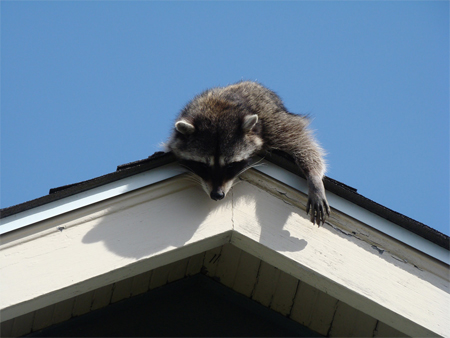Trim the trees around your home so the raccoons don t have an easy pathway from your surrounding trees to your roof.
Raccoons living on my roof.
Keep vines and other plants that are growing up your home s exterior short so raccoons can t use them as a type of.
Raccoons will use trees and branches next houses to access roofs.
All they need is cover from the sun and elements and they are set.
Females are known to destroy soffits fascia boards shingles vents and insulation to establish denning sites.
You might find one curled up under the eave or even trying to find its way into the attic through a vent in the roof.
They can ascend the.
Once a raccoon creates or enlarges a hole in the rooftop it becomes an easy pathway to the attic.
With the different styles of roofs on homes these days there could even be a place for the raccoon to live on your roof.
Climbing is one of the natural instincts for the raccoon and with paws and limbs designed for scrambling up a variety of surfaces it is no surprise that raccoons are often a problem that can appear on the roof of many buildings.
Raccoons on roofs can cause significant damage to your property.
Whether it is climbing up drainpipes or walls that offer small areas where they can grip or they are getting on to the roof from adjacent trees it is important to remove the raccoons from the roof as soon as.
Large mature trees are sought after by many homeowners for their beauty and shade but large trees mean long branches that can overhang roofs.
Raccoon rely on trees to nest and escape from predators.
2 if they are up there for shelter you can eliminate debris or gaps under eaves that they like.
Female raccoons usually give birth to their young in the mid to late parts of spring and into the summer.
Eliminate any food sources surrounding your home that could lead.
Removing a raccoon on the roof.
Raccoon on the roof.
3 they are most.
Raccoons on the roof how to remove them 1 raccoons are excellent climbers so it s fairly difficult to keep them from climbing on the roof.

